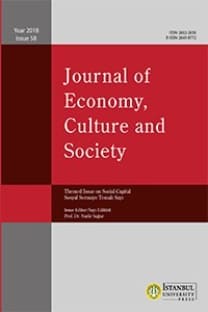Exploring Transformation Through Travel by Means of the Movie The Way
Exploring Transformation Through Travel by Means of the Movie The Way
Travel, tourism transformation, transformative experience, The Way,
___
- Berger, P. L., & Luckmann T. (1967). The social construction of reality: A treatise in the sociology of knowledge. London: Allen Lane.
- Brown, L. (2009). The transformative power of the international sojourn: An ethnographic study of the international student experience. Annals of Tourism Research, 36(3), 502-521.
- Brown, L. (2013). Tourism: A catalyst for existential authenticity. Annals of Tourism Research, 40, 176-190.
- Coghlan, A., & Weiler, B. (2018). Examining transformative processes in volunteer tourism. Current Issues in Tourism, 21(5), 567–582.
- Cohen, S., & Taylor, L. (1992). Escape attempts. The theory and practice of resistance to everyday life. London: Routledge.
- Council of Europe. (2022). Santiago de Compostela Pilgrim Routes. Retrieved from https://www.coe.int/en/web/cultural-routes/the-santiago-de-compostela-pilgrim-routes.
- Devereux, C., & Carnegie, E. (2006). Pilgrimage: Journeying beyond self. Tourism Recreation Research, 31(1), 47-56.
- Estevez, E.; Alexanian, D.; Rodriguez, F. J. (Producer), & Estevez, E. (Director). (2010). The Way [Cinema Film]. Spain: Filmmax.
- Gros, F. (2014). A Philosophy of Walking (John Howe Trans.). London, New York: Verso.
- Jaspers, K. (2010). Felsefe Nedir? (İsmet Zeki Eyuboğlu Trans.). İstanbul: Say Yayınları.
- Kay Smith, M., & Diekmann, A. (2017). Tourism and wellbeing. Annals of Tourism Research, 66, 1–13.
- Kirillova, K., Lehto, X., & Cai, L. (2017a). What triggers transformative tourism experiences? Tourism Recreation Research, 42(4), 498–511.
- Kirillova, K., Lehto, X., & Cai, L. (2017b). Tourism and Existential Transformation: An Empirical Investigation. Journal of Travel Research, 56(5), 638–650.
- Kottler, J. (1997). Travel that can change your life: How to create a transformative experience. San Francisco: Jossey-Bass.
- Lean, L. L. (2012). Transformative travel: A mobilities perspective. Tourist Studies, 12(2), 151-172.
- Lee, Y. J., & Woosnam, K. M. (2010). Voluntourist transformation and the theory of integrative cross-cultural adaptation. Annals of Tourism Research, 37(4), 1186–1189.
- Lewis, D. (1988). “What experience teaches” Proceedings of the Russellian Society, University of Sydney, 13: 29–57.
- MacCannel, D. (1973) Staged Authenticity: arrangements of social space in tourism settings. The American Journal of Sociology, 79(3), p. 589-603. DOI: https://doi.org/10.1086/225585
- MacCannell, D. (1976). The tourist: A new theory of the leisure class. New York: Schocken.
- Mezirow, J. (1994). Understanding transformation theory. Adult Education Quarterly, 44(4), 222–232.
- Morgan, A. (2010). Journeys into transformation: travel to an ‘other’ place as a vehicle for transformative learning. Journal of Transformative Education, 8(4), 246–268.
- Noy, C. (2004). ‘This trip really changed me: Backpackers’ narratives of self change. Annals of Tourism Research, 31(1), 78–102.
- Paul, L. A. (2014). Transformative Experience. Oxford: Oxford University Press.
- Pine, B. J. & Gilmore, J. H. (2011). The Experience Economy, Boston: Harvard Business Review Press.
- Pung, J.M. & Del Chiappa, G. (2020). An exploratory and qualitative study on the meaning of transformative tourism and its facilitators and inhibitors. European Journal of Tourism Research, 24, 2404.
- Pung, J. M., Gnoth, J., & Del Chiappa, G. (2020). Tourist transformation: Towards a conceptual model. Annals of Tourism Research, 81, 102885. Reisinger, Y. (2013). Transformational tourism: Tourist perspectives. Oxford, UK: CABI.
- Rickly-Boyd, J. M. (2012). Lifestyle climbers: Towards existential authenticity. Journal of Sport & Tourism, 17(2), 85–104.
- Sampaio, S., Simoni V. & Isnart, C. (2014). Tourism and transformation: Negotiating metaphors, experiencing change. Journal of Tourism and Cultural Change, 12(2), 93-101.
- Santos, M. C., Ferreira, A., Costa, C., & Santos, J. A. C. (2020). A Model for the development of innovative tourism products: From service to transformation. Sustainability, 12(11), 4362.
- Sheldon, P. J. (2020). Designing tourism experiences for inner transformation. Annals of Tourism Research, 83.
- Smith, J. (2017). Transforming travel: Realising the potential of sustainable tourism. Wallingford, UK: CABI.
- Soulard, J., McGehee, N. & Knollenberg, W. (2020). Developing and testing the transformative travel experience scale (TTES). Journal of Travel Research
- Tasci, A. D. & Godovykh, M. (2021). An empirical modeling of transformation process through trip experiences. Tourism Management, 86, 104332.
- Teoh, M. W., Wang, Y., & Kwek, A. (2021). Conceptualising co-created transformative tourism experiences: A systematic narrative review. Journal of Hospitality and Tourism Management, 47, 176–189. doi:10.1016/j.jhtm.2021.03.013.
- Thoreau, H. D. (1862) Walking. Retrieved from https://www.gutenberg.org/files/1022/1022-h/1022-h.htm
- United Nations World Tourism Organization (2016), Affiliate Members Global Reports, Volume fourteen –The transformative power of tourism: A paradigm shift towards a more responsible traveller, UNWTO, Madrid.
- Walker, J. (2017). Shame and Transformation in the Theory and Practice of Adult Learning and Education. Journal of Transformative Education. 15(4):357-374. doi:10.1177/1541344617699591
- White, N. R., & White, P. B. (2004). Travel as transition: Identity and place. Annals of Tourism Research, 31(1), 200–218.
- ISSN: 2602-2656
- Yayın Aralığı: 2
- Başlangıç: 1960
- Yayıncı: İstanbul Üniversitesi Yayınevi
İsa DEMİR, Cem Koray OLGUN, Cihad ÖZSÖZ
Market Liberals at a Crossroads in Post-Gezi Turkiye: Making Sense of a Framing Dispute
H. Bahadır AKIN, Mustafa Cüneyt ÖZŞAHİN, Şeyma AKIN
Moral Boundaries and Cultural Membership: Perceptions of the LGBTQ in Turkiye
Sun FEİHAN, Granovskaya OLGA, Miao XUMEİ, Ye CHONGLİANG
Dominant Religion, Radical Right-Wing, and Social Trust: An Empirical Investigation
Sacit Hadi AKDEDE, Jinyoung HWANG, Nazlı KEYİFLİ
Iranian Merchants as a Religious Community in Late Ottoman Istanbul
Exploring Transformation Through Travel by Means of the Movie The Way
